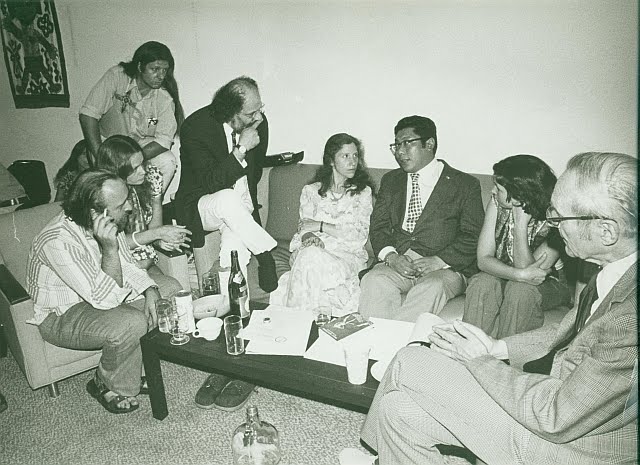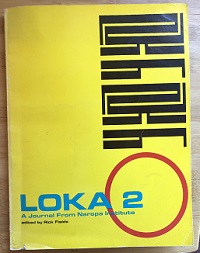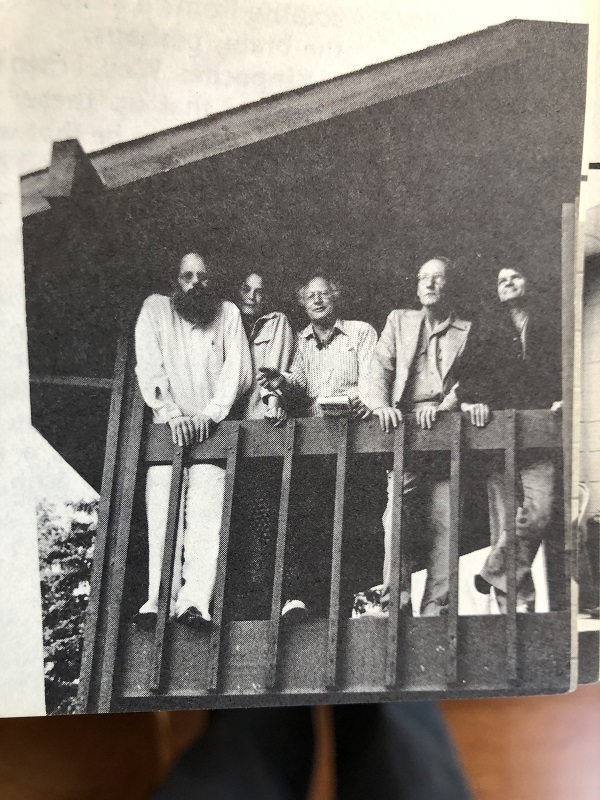Discussion with Allen Ginsburg. Anne Waldman, and Chogyam Trungpa Rinpoche


Loka 2
A Journal From Naropa Institute, 1976
Rinpoche: My approach to writing poetry in the Tibetan language is to try to use the classical Tibetan format, without the classical Indian influence — the Tibetans’ own poetry, the Tibetans’ own language. I am trying to use the spoken language, the colloquial language of modern Tibetan in such a way as to create a surprise for new generations of Tibetans so that they also can compose poetry according to their own vision rather than having to stick to a format. Some of my Tibetan poems have been translated into English. In my English-language poetry, I’ve been working on improvising.
Ginsberg: Is improvising a part of traditional Tibetan poetic practice?
Rinpoche: Well, actually, the whole thing is divided into two types. We have very stuffy poetry in the Tibetan tradition, which uses all kinds of synonyms instead of real names. The sun is referred to as “He who has seven horses for his chariot.” Things like that. That kind of poetry follows the Indian school and tends to use themes from the Mahabharata and other myths and stories. It’s very technical, in fact. So that’s what’s actually known as poetry. The Tibetan word for poetry is nyen-ngag which means “beautiful sound” or “beautiful utterance” or “beautiful voice.”
Then there are the songs which are much closer to Western poetry actually, like the songs of Milarepa and other inspirational songs which are called nyamgur. These correspond to doha in the Indian traditions. These are usually spoken on the spot by a master, and students take down notes. Or else they are written down by the master, but still they are composed on the spot, without conforming to a particular strain of the Indian tradition. This is a spontaneous way which seems to be more apt and accurate.
Ginsberg: Did the “doha” type, the “utterance,” use colloquial language?
Rinpoche: It depends on the period, as well as on how free and brave the poet was or is. Milarepa, for example, spoke almost illiterately; not like an educated person, but like a peasant or a farmer. Milarepa’s poems are not regarded as academically correct; that is, they do not conform to the conventions of Indian poetry. They are on a level of folksong which arouses people’s minds, so therefore they are the most immediate and impression-making poems that can be written. My lineage in particular, the Kagyu lineage, has been working on that kind of poetry. And so we have people in the lineage composing such poems constantly, working from personal experience rather than trying to stick with the Indian format. It’s a kind of free expression that has developed.

Allen Ginsberg, Anne Waldman, Robert Bly, William Burroughs, Gregory Corso
Boulder Summer 1975.
Waldman: So there’s no spiritual transmission in the poetry —
Rinpoche: Some of the spiritual teachers, like the Eighth Karmapa who was a holder of the Kagyu lineage, were great scholars in the traditional Indian poetry. But when they sang songs of their own experience, they dropped the format. They just spoke out ordinarily. But if they had to send a formal letter to the king, or the Dalai Lama, they would usually start and end with the formal poetry of the Indian tradition.
The folk poetry that exists in Tibet is usually not regarded as poetry but is regarded as folksong.
They don’t exactly go to music but there’s some melodic rhythm involved. They express the mood of a particular day, a particular year or a particular political era. Actually, the colloquialness has a very blunt and sincere and slightly stupid quality about it which is very beautiful when you mix that with the inspiration of Buddhist meditation. Then the whole thing becomes very real.
Waldman: By stupid, you mean sort of awkward, straight from the mind?
Rinpoche: Yes, kind of blunt and too sincere. If you use a hundred percent that kind of language, it becomes too naive.
Ginsberg: So what kind of form do you use when you are writing in Tibetan? Do you rely on fixed forms and stanzas?
Rinpoche: Lately I’ve been trying fixed lines with eighteen syllables which is the classical tradition. Nobody these days writes eighteen-syllable lines. There is also the seven-syllable line, which is popular and common in the folk poetry. The traditional nyen-ngag is based on nine syllables. Milarepa’s songs are in nine-syllable lines. The nine-syllable line can be given different stress points which express some sense of immediacy. The seven-syllable lines are still more immediate. They express emotions more because there is no time or opportunity to use too many words. They have to be immediate. The nine-syllable lines are more eloquent. You can use metaphor to stretch them out more.
Ginsberg: Do they have any kind of rhyme?
Rinpoche: Occasionally. Occasionally the brilliant ones use puns, which is a mark of enormous courage and accomplishment in poetry. Milarepa says to the logicians, “And I have never cooked the stew of logic.” That’s how it is translated into English. But in Tibetan, stew is tsoma and logic is tsema, so “I never cooked the tsoma of tsema.”
Ginsberg: When you write in English, what do you carry over?
Rinpoche: Not particularly much. When I write in English there is a problem that might come up since it is not my own language. At the same time I have to speak some kind of message which is always in one’s mind. And at the same time, the spontaneity comes through as well. So I just regard the poems that I write in English as fingerpainting in my mind. Just straightforward.
Waldman: A lot of American poets are working that way as well.
Ginsberg: Still fingerpainting. I do.
Waldman: And concerned with spontaneity. A lot of reading out loud. Hearing the poetry that way rather than getting it off the page.
Rinpoche: Yes. It seems, if I may raise the point, that in order to be a poet you have to be in some way or other humorous as well as have a tinge of neurosis. Whether that neurosis is related with enlightenment or craziness (where craziness expresses itself in the ideal word) there is some kind of bravery, some kind of eccentriciity that seems to be required. Otherwise —
Waldman: Sort of being on the edge, so that you represent both sides of something, which is slightly schizophrenic.
Rinpoche: I think that a poet’s mind functions entirely differently, that in some sense you could say that poets are haunted by their poetry, not their poetry but the concept of poetry. Each time when you look at the world in a different way — when you take an airplane, when you travel in a train, when you meet cab drivers, when you shop in a grocery — whatever you do, something flashes back to you. There is a kind of fundamental humor and fundamental craziness which constantly gives you lots of material and clarity at the same time.
Ginsberg: Is that humor or craziness, the eyeball of poetry, any different from the humor and craziness of the eyeball of meditation?
Rinpoche: Not at all. But I think in meditation you don’t look for material; you just develop awareness, you just sail through. In the case of poetry you are talking to yourself.
Ginsberg: Is there anything really great in ancient Tibetan traditional poetry?
Rinpoche: There was a great poet called Perna Karpo. He was a great scholar and he wrote a whole sadhana following the format of traditional poetry. And once you can see that complete structure, it’s fantastic, it’s really great. But there’s a lot of room for stiffness at the same time. It doesn’t make any sense unless you are a poet yourself and can read what is meant. There are so many synonyms and there is so much humor that it is sort of an in-joke kind of thing. There’s so many allusions an ordinary layman couldn’t follow it all; only a scholar could.
Ginsberg: When did you read that?
Rinpoche: When I was nine.
Ginsberg: Did you get anything out of it?
Rinpoche: I did actually, I got an enormous kick out of it. Then when I was about thirteen or fourteen, I was influenced by Jigme Lingpa who is the Nyingmapa master. His work is partly nyamgur or doha, and partly poetry at the same time. I tried to imitate his style. Before I left my country I thought I was going to get into the Tibetan national cult. Then as I was escaping from my country, I met a lot of people, ordinary peasants, who had a very strange way of talking. I thought that was very fantastic, so I tuned myself into a new style of poetry which is not formal but still borrows certain classical words in the midst of colloquialism. Which makes it a different thing. As in ivory, you know, you have the ornament of the inlaid jewel.